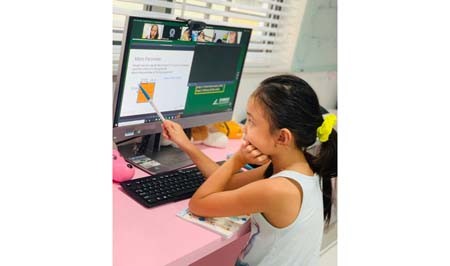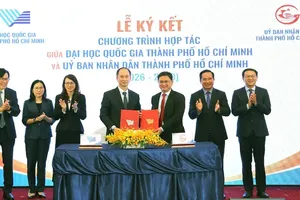
In Le Duc Tho Primary School, located in Go Vap District of Ho Chi Minh City (HCMC), from the middle of last week, teachers began to upload 30-to-60-minute lessons for all five grades on a YouTube channel, along with home assignments via Zalo, Viber apps and emails. The school actively sends weekly agendas of all subjects, including math, literature, arts, physical education, English, to parents. At the end of each day, parents need to report their children’s learning process and any possible questions to the head teacher.
Similarly, in Le Van Tam Primary School, sited in Tan Phu District, head teachers of all grades contacted parents to give detailed instruction for the upcoming online learning process and ask for collaboration. At the moment, after finishing teaching plans for all subjects, the school is now organizing online review lessons, followed by new lessons from Week 21 to Week 23 of the Second Semester. Teachers of each training session have to report pupil attendance to deliver timely notice. At the end of each lesson, multiple-choice tests are used to check the pupils’ understanding.
Nguyen Binh Khiem Primary School in District 1 selects another method of teaching via Zoom for learners to interact with teachers directly using their own computer or mobile device. The school also introduces its e-Learning database on its website, with regular updates of new daily lessons for both parents and pupils. Presently, students of grades 1, 2, and 3 can watch clips of math and literature while those of grades 4 and 5 also have lessons in history, geography, and science. The school website is a communication channel between teachers and parents as well so that proper guidance can be delivered to help children learn and play effectively during this prolonged break.
According to Mr. Le Ngoc Diep, former Head of the Primary Education Division under the HCMC Department of Education and Training, in developed countries, e-learning is introduced to the public after careful professional preparation of the teaching staff regarding content and evaluation forms. Before the launch of e-learning, parents and students attend training sessions to become familiar with possible operations while learning.
He added that unfortunately, in Vietnam, the situation is not the same due to the unexpected Covid-19 outbreak. Vietnam has come to online learning as an essential method to avoid cramming when students return to school in the future. Without proper preparation, e-learning has created various issues for both teachers and learners.
Mr. Diep suggested that related state agencies should consider introducing guidance for content selection and teaching methods used especially for online lessons. He stated that if teachers apply the same traditional teaching method into online teaching, or mechanically capture teaching actions into clips, these sessions will not become attractive enough.
Instead, he recommended that teachers should use new warm-up activities, integrate knowledge presentation with project activities.
A teacher from a primary school in District 5 affirmed that as long as first graders can recognize the alphabet successfully, they can participate in online lessons. It is more critical for teachers to focus on how to take full advantage of e-learning with rich dynamic resources, meaning transforming their role from a trainer to a guide to help learner self-study effectively and develop their soft skills.
























